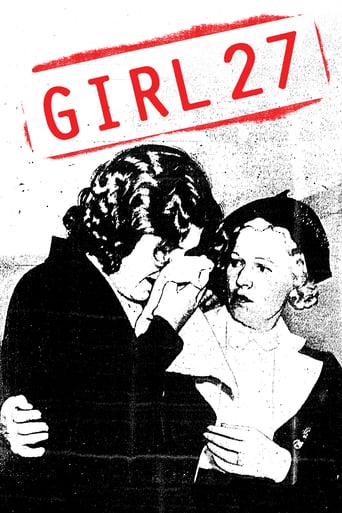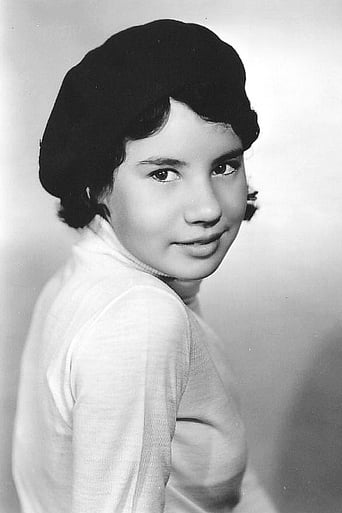Girl 27 (2007)
The reclusive Patricia Douglas comes out of hiding to discuss the 1937 MGM scandal, in which the powerful film studio tricked her and over 100 other underage girls into attending a stag party, where she was raped.
Watch Trailer
Cast


Reviews
I love this movie so much
Too much of everything
By the time the dramatic fireworks start popping off, each one feels earned.
The best films of this genre always show a path and provide a takeaway for being a better person.
The subject of Girl 27 is incredibly relevant today, more so now than when it debuted about a decade ago. It involves a 1937 scandal, where an MGM extra girl named Patricia Douglas was raped after being lured to a big studio party under false pretenses. She took the attack to court, but was slandered as a "tramp," the sole witness to the attack was bullied into perjury, and the case was buried for decades. Douglas's life afterwards was one of loneliness and bitterness; the rape affected her all her life. This is a story which reveals how the wealthy and powerful are allowed to escape the consequences of any wrongdoing. Considering the sexual abuse allegations which have come out in Hollywood recently, this story is as relevant in 2017 as ever. It is a story worth telling.Too bad the filmmakers handling this story are incompetent.There are so many things which keep this documentary from being great. Firstly, while I get why Stenn wanted to use film clips of women being harassed or hit in the Hollywood movies of the period- to show how social misogyny manifested in popular entertainment in subtle and not so subtle ways-it all comes off as cartoonish, almost making light of this woman's tragedy when we're talking abuse one minute, then showing Betty Boop and MGM musical clips with horror movie music over them the next. It reminds me of a similar technique used in the documentary Buster Keaton: So Funny It Hurt, where they felt the need to try to "illustrate" Keaton's bad home life and alcoholism with clips from his MGM talkies. Here, it is FARRR worse, given the nature of the subject matter. It doesn't feel edgy or smart; it feels tacky and amateurish at best, disrespectful at worst.Stenn also feels the need to prop up his own ego constantly, reminding us of how good and noble HE is for bringing this story to light. He turns the camera on himself often. I get the meta approach, but he often seems like he wants to show off how knowledgeable he is about classic film or how morally stupendous he is for making this movie, even though at times he asks her rather invasive questions that almost seem exploitative. Whenever Stenn talks about how he was nervous when meeting Douglas face to face for the first time and then we have a few minutes of Douglas praising him for his "sweetness"-ugh, we get it Stenn, you're sooo great. GET BACK TO THE STORY.Of course, the documentary is worth watching because Douglas was truly a remarkable, brave woman to try to fight the studios back for the injustice done her in an age when victims of sexual violence were forced into silence due to shame and social pressure. In the recorded interviews, she comes off as a feisty yet bitter woman who wants public vindication after being humiliated and slandered-she now has it. Honestly, you're probably better off reading Stenn's article on Douglas's sad story, which is concise, detailed, and full of the same details that the movie gives, but without the obnoxious ego boosting or distracting, tone deaf movie clip montages.
"Girl 27" is a fascinating story of Hollywood history and the workings of the studios. The studios owned Hollywood: the police, the DA, all the way up. The movie magazines were studio organs. They had private hospitals, doctors on payroll. Anything could be hidden.Patricia Douglas was a young girl working in Hollywood as a dancer. "I moved like J.Lo" she tells the interviewer, David Stenn. One day she and some other women were asked to report to what they believed to be a film set, and they were sent to Western Costume to get costumes. When they arrived on the "set," it was a convention on a farm for MGM salespeople. Patricia Douglas was raped by one of them in a field. It was hushed up, and the doctor, under MGM's influence, put in her record that she had been treated for VD.Patricia attempted to sue but lost, so she took it to Federal Court. MGM bribed her mother and lawyer to make the case go away, and they did. The lawyer never showed up in court any time the case was called. Her mother got a liquor store out of it.At the time of the documentary, Patricia Douglas was 84, living alone in Las Vegas, when she was found by writer-producer Stenn. At first he spoke with her on the phone - she would say so much and then hang up abruptly. Finally she agreed to meet him and tell her story.There have been many complaints about Stenn's presence in this film. I used to work for David Stenn. When he says he loves Patricia Douglas, he's not playing nice to get the story at all. He's not that kind of person. As for his presence in the film, she would only talk to him, so he was stuck there - yes, he could have cut himself out. In the beginning, I think he had to lay the foundation as he did - he is a film historian, an expert on MGM and that era. Did he have to mention Jackie Onassis? Probably not, but I think it made his credentials all the more impressive.There's nothing uncommon in a documentary about looking at records and having someone go over them with you. So maybe in total, five minutes of Stenn could have been cut. I do not think he took away from this woman's agonizing story.Not only is this a searing documentary about the machinations of MGM and Mayer, it is such a sad commentary on the time during which Patricia Douglas was young. Families swept incidents such as rape under the rug. There was no place she could go for help. She was never able to move on. It ruined her life. She said she was frigid. She was married three times; she wanted a child desperately to love and be loved, yet she gave the child to someone else to raise. She couldn't get too close to anyone.Her beautiful daughter tells a sad story about their relationship or lack of it. Patricia never told anyone what had happened to her. When the story broke in Vanity Fair, she told her mother that she was so incredibly proud of her. And her mother said nothing.It's such a tragic account, it breaks your heart. An entire live ruined. Patricia could have tried to move on, but how does one do that when violated and no one acknowledges it? When everyone expects you to act as if nothing's wrong? The studio heads were sleazes. When I interviewed actress Rita Gam, an incredibly beautiful woman even today, she said she received many offers from Hollywood. But she smartly waited until she was offered a contract for $1250 a week. Why? Because if you made less than that, she said, you were part of the "visiting firemen" circuit, in other words, a prostitute. Starlets were expected to sleep with men for jobs, and at the behest of the studio. Even Rita Hayworth's husband tried to pimp her out to Harry Cohn.I think the story overrides David Stenn's presence in the film, which some find offensive. Personally I didn't mind it. I loved the film clips that were interjected. A nice touch to a horrible story.
I just watched "Girl 27" on Netflix instant stream. It's a very sad movie, but I think it's worth checking out, particularly if you're a starry-eyed youth thinking of making a career in show business.The truth is, the world's a pretty nasty place, and you shouldn't trust people. Maybe that doesn't sound very nice to say, but it's the truth. It's just too bad no one ever told poor Pat Douglas that when she was growing up."Girl 27" tells the story of Pat Douglas, a young extra in the early days of Hollywood who gets raped at MGM and the subsequent cover-up that took place to protect the studio from the backlash after Douglas went public with her story.I know a lot of people have given this film negative reviews and I can't really understand why. It seems a common complaint is the director's mishandling of the material or his apparent need to put himself in front of the camera instead of the real "star".Well, first off, I'm in no way affiliated with the director, but I think if he's the one to uncover the story, he has the right to appear in his own documentary. Secondly, no one ever stopped to consider that maybe Pat Douglas wasn't comfortable talking on camera long enough to make a whole film out of it -- and that the director had to relay some information himself? I don't know...I guess I just think the people who voted this movie down because of the director missed the point of the whole documentary. It's about Pat Douglas and her tragic story, and I'm just glad the story got out and without the director that wouldn't have happened.Some may say he exploited her again for the purpose of a story, but I don't see that. I think he gave her the only vindication she received in her whole life. Otherwise, the story would never have been told, as I said before, and I think as tragic as the story is, it serves as a warning of the dangers of being young and naive and unaware of the dangers that exist in this world.I would recommend checking this movie out -- it's really sad, but I'm glad to have seen it -- because nothing like this should have to happen to anyone...and awareness is key to keeping stuff like this from happening to anyone else.
This is another one of those documentaries that should that teach young filmmakers to leave themselves out of their own flicks. No matter how compelling the story, people don't appreciate hearing about how the writer/director himself is a great man simply for stumbling upon a story and having the ability ask questions. An example of my main problem with this film is the three minutes of the director getting stood up in Las Vegas. Three minutes later there's a lengthy montage of the subject telling us how great the director is--he feigns humility by pretending to protest her praise AND INCLUDES IT IN THE FILM!"Girl 27" is very much like "Cropsey," which should have been called "A Pair of Failures (Who, with Better Looks, Would have been Actors or, with More Investigative Skills, Detectives, but have Sadly Fallen into the Business of Boogieman Speculation Documentary) Running Around, Pushing Doorbells, Getting Jerked Around, and Ultimately Concluding Nothing." This is not to say that I expect anyone to actually SOLVE a mystery or tie up all of the facts with a nice little bow right before the credits hit, either. But I never throw on a documentary hoping to see the filmmakers throwing tantrums and getting upset when they hit a dead end. We're not all holding our breaths in anticipation of an interview that never happens, just because it's a monumental moment in the otherwise unremarkable life of a loser with a camera.This is one of those films where the director tries to associate themselves with a history that they had nothing to do with. After the trite Bible cliché to open the film (please folks, this overused even more than the opening line, "When I was a child, I used to dream that..."), the first voice we hear and the first interview we see is the director's. And he's making a case for the importance of HIS unearthing this story--even Greta Van Susteren hadn't heard of it! Jackie O. gave HIM a mandate! I found the director instantly off-putting, but because of the subject matter I continued watching like I did with "Intangible Asset No. 82." (Like "I.A. #82" this filmmaker goes to great lengths to tell you how little information exists on the topic before he proceeds to waste minute after minute of needless, self-inflating face-time.) This guy interviews people but inexplicably you hear him talking more than the interviewees. Directors should leave themselves out of their documentaries. I would say that the only exception should be when the filmmaker is an activist/advocate in the Michael Moore vein or when the draw of the filmmaker would increase awareness (as with "An Inconvenient Truth").Filmmakers: learn from "Brother's Keeper," "Romántico," "Man on Wire," "Marwencol," The Thin Blue Line," "Shotguns and Accordions," "Panama Deception," "You can't be Neutral," and other films that care more about the dignity and the humanity of the topic rather than with trying to entertain a mass Dateline-style audience.That this film is so formulaic isn't what's so egregious. I'm not rating this film based on the original music that could have been the soundtrack to 100 different mainstream documentaries over the last decade... [...It does seem that the higher-profile documentaries ("Freakonomics," "Client 9," "Food Inc.," "Casino Jack," "Plunder") don't teach you anything that you didn't already know if you cared at all about any of the topics. They're like the movie-form of a Wikipedia page. I don't really understand why people leave out facts and context that they try to squeeze onto DVD extras because the running time has been taken up with clips from Jimmy Stewart movies and montages conceived with classic rock song titles in mind. Films such as these seem to me more like a "Steal This Movie" or "Son of Sam" kind of biopic without professional actors. But by simply relating the story in "Girl 27" we are provided with more than we ever knew before, so a less-egoistic writer/director had the potential to make a very enlightening work.]...I also don't fault the writer/director for feeling a connection to the story that they are making--I WANT them to care intensely. But, filmmakers, if the subject matter is truly noteworthy and you are concerned about the running time of the film, I can't help but think that the cause you are fighting for (and the viewing audience) are better served by your not making a movie about you making a movie about some other person.







